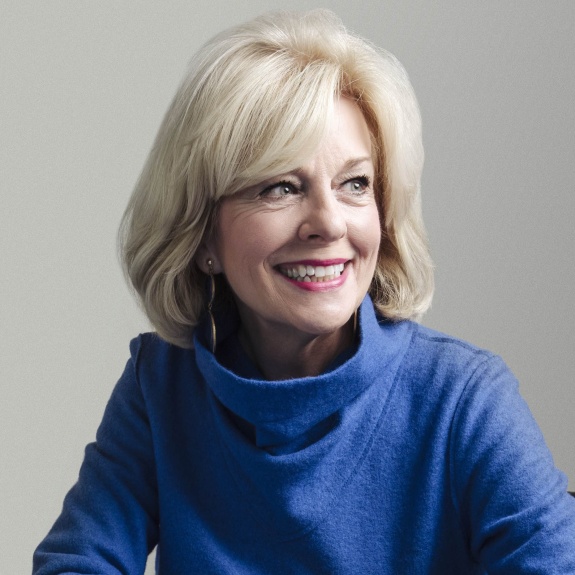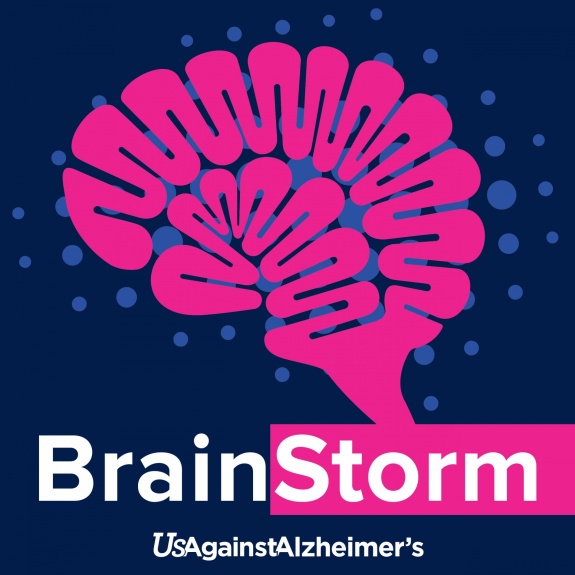Subscribe on your favorite player
Listen on Apple Podcasts Listen on Spotify Listen on Stitcher Listen on Google PodcastsThe Importance of Brain Health in Uncertain Times - Dr. Sandra Bond Chapman

About This Episode
This is our first UsAgainstAlzheimer’s BrainStorm episode. BrainStorm is a new series that features conversations with experts on the science of keeping your brain healthy, early detection and intervention in Alzheimer’s, and working toward brain health equity regardless of sex, race or ethnicity. Watch for BrainStorm every other month and, in alternating months, Alzheimer’s Talks, which features discussions of groundbreaking research and its importance to those living with Alzheimer’s and their caregivers.
Press the 'Play' button under the image at left to hear the full conversation. Or watch the webcast here.
So much is uncertain during the COVID-19 pandemic: the way we work, interact, and try to keep healthy.
Researcher Dr. Sandra Bond Chapman spoke with host Meryl Comer about the impact of stress and anxiety, the science of cognitive training, and the promising future of taking charge of your brain. Dr. Chapman is Founder and Chief Director of the Center for BrainHealth® at The University of Texas at Dallas and author of Make Your Brain Smarter.
Regarding this time of COVID-19, Dr. Chapman said, “The world as we’ve known it has been turned upside down. It takes a great toll on our brain, but the brain is still our greatest asset to work through this.”
Learning how to use our brain to control stress is important for everyone. Dr. Chapman offered a number of strategies to help:
- Develop a sense of your stress levels: ask yourself, how high is my stress right now?
- Breathe in slowly, then breathe out. Repeat this a few times.
- Get outside to be around nature, even if it’s to look at a flower in your yard.
- Rather than thinking about changes, scarcities or losses due to COVID—things we cannot control—each day, think of two things you can do in 30 minutes to feel a small victory.
- Focus on one or two positive things that have happened each day.
- Laughter is great medicine for the brain. Try to find two things to laugh about each day.
- Reduce the negative information you consume. It builds negative neural networks that your brain cannot see past.
- Take breaks from ensuring that the kids do their schoolwork or from meeting your older parents’ needs. Step back from the burden of responsibility, to do things together and experience the joy of being a family.
- When possible, take things one to two hours at a time. Avoid worries about one to two months from now. Your brain can figure out a way through shorter timeframes.
Dr. Chapman spoke of “rebooting” your brain. Learn to recognize how mentally energetic you feel at any moment. Acknowledge that maybe you shouldn’t have that tough conversation now, that maybe you don’t have patience at this moment and that your mental energy needs to be reset. If you just keep going, “you’re actually tearing down the gears of your brain. If you’re cycling up a mountain, stop for five minutes, then restart, and you’re more capable of finishing.” Older adults can do things more efficiently using this strategy.
She responded to audience questions about a range of circumstances:
- Mild cognitive impairment: Embrace what you still can do and do not focus on memory loss. Staying engaged where you are cognitively can keep the brain functioning longer.
- Concussions: The brain can be strengthened even long afterward. The window of repair is not three to six months but the rest of your life.
- Family caregivers: Focus on what your loved one with Alzheimer’s can still do, which may change your perspective of them and change the relationship dynamic. Caregiving is constant, so be sure to take care of yourself: “What can you do to celebrate a victory for yourself? Celebrate with your family member. ‘What can I control today? What sense of happiness can I share?’”
Dr. Chapman is leading the BrainHealth Project, a major research study that seeks to learn if we can delay Alzheimer’s and shift our brains’ peak years from age 30 to much later. In January 2021, the study starts enrolling 12,000 people who can remain in the study for 10 years. Most will be able to participate online. Ultimately, the project will enroll 120,000 healthy people, aged 10 to 100. Visit http://brainhealth.utdallas.edu/the-brainhealth-project/ to learn more and sign up for updates.
For small things you can do for your brain each day, check out UsAgainstAlzheimer’s Be Brain Powerful campaign and sign up for the 30-Day Brain Health Challenge.
